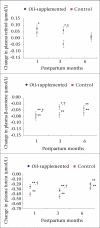Effect of dietary fat supplementation during late pregnancy and first six months of lactation on maternal and infant vitamin A status in rural Bangladesh
- PMID: 20824976
- PMCID: PMC2965324
- DOI: 10.3329/jhpn.v28i4.6039
Effect of dietary fat supplementation during late pregnancy and first six months of lactation on maternal and infant vitamin A status in rural Bangladesh
Abstract
Dietary fat intake is extremely low in most communities with vitamin A deficiency. However, its role in vitamin A status of pregnant and lactating women is poorly understood. The aim of the study was to examine the effect of supplementing women with fat from mid-/late pregnancy until six months postpartum on their vitamin A status and that of their infants. Women recruited at 5-7 months of gestation were supplemented daily with 20 mL of soybean-oil (n = 248) until six months postpartum or received no supplement (n = 251). Dietary fat intake was assessed by 24-hour dietary recall at enrollment and at 1, 3 and 6 months postpartum. Concentrations of maternal plasma retinol, beta-carotene, and lutein were measured at enrollment and at 1, 3 and 6 months postpartum, and those of infants at six months postpartum. Concentration of breastmilk retinol was measured at 1, 3 and 6 months postpartum. The change in concentration of plasma retinol at three months postpartum compared to pregnancy was significantly higher in the supplemented compared to the control women (+0.04 vs -0.07 micromol/L respectively; p < 0.05). Concentrations of plasma beta-carotene and lutein declined in both the groups during the postpartum period but the decline was significantly less in the supplemented than in the control women at one month (beta-carotene -0.07 vs -0.13 micromol/L, p < 0.05); lutein -0.26 vs -0.49 micromol/L, p < 0.05) and three months (beta-carotene -0.04 vs -0.08 micromol/L, p < 0.05; lutein -0.31 vs -0.47 micromol/L, p < 0.05). Concentration of breastmilk retinol was also significantly greater in the supplemented group at three months postpartum than in the controls (0.68 +/- 0.35 vs 0.55 +/- 0.34 micromol/L respectively, p < 0.03). Concentrations of infants' plasma retinol, beta-carotene, and lutein, measured at six months of age, did not differ between the groups. Fat supplementation during pregnancy and lactation in women with a very low intake of dietary fat has beneficial effects on maternal postpartum vitamin A status.
Figures
References
-
- Christian P, West KP, Jr, Khatry SK, Katz J, Shrestha SR, Pradhan EK, et al. Night blindness of pregnancy in rural Nepal—nutritional and health risks. Int J Epidemiol. 1998;27:231–7. - PubMed
-
- Katz J, Khatry SK, West KP, Humphrey JH, Leclerq SC, Kimbrough E, et al. Night blindness is prevalent during pregnancy and lactation in rural Nepal. J Nutr. 1995;125:2122–7. - PubMed
-
- Newman V. Vitamin-A and breast-feeding: a comparison of data from developed and developing countries. Food Nutr Bull. 1994;15:161–76.
-
- Underwood BA. Maternal vitamin A status and its importance in infancy and early childhood. Am J Clin Nutr. 1994;59(Suppl):517s–24s. - PubMed
Publication types
MeSH terms
Substances
LinkOut - more resources
Full Text Sources
Other Literature Sources
Medical



